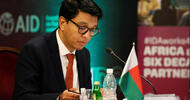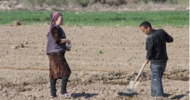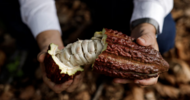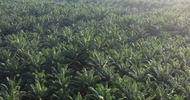Foreigners mostly seek agricultural land and land for tourism developments, but all foreigner-owned land in Africa holds the potential to prompt violence from displaced people.
A new study in Environmental Research Letters finds that at least 126 countries are now involved in purchasing or selling global farmland.
At the heart of the current conflict is the government's development policy and the uncontrolled influx of migrants acquiring lands in the indigenous people’s territories.
Arab countries are increasingly seeking to secure their food needs through an international strategy of land grabs which are often detrimental to local populations.
US government reviews efforts to implement voluntary guidelines and go further in legitimising or building consensus around largescale farmland deals
CIFOR scientist argues that failure to accept large-scale farmland investments as a new economic reality in Africa will hold back the development of effective institutional and regulatory frameworks.
In five short years, rich countries have acquired about 80 million hectares of land in Africa and other developing countries in what is now a worrying trend.
- Africa Review
-
01 Mar 2014
Karturi Ltd, the Kenyan flower production unit of Karuturi Global, is in financial collapse and been put under receivership. One of the world's most infamous landgrabbers is in its deepest trouble yet.
- TJN et al
-
14 February 2014
A controversial foreign investment to produce agrofuels for Europe on 20,000 ha in Senegal has angered communities and sparked violent clashes between peasants and the police.
- CRAFS, GRAIN, Re:Common
-
07 November 2013
Indian companies have attracted global controversy for a spate of large land deals across Africa, yet the Indian Export and Import (Exim) Bank has largely steered clear of directly financing land deals.
The Kenyan government has found Karuturi Global Ltd, the world's biggest producer of cut roses, guilty of tax evasion. This is the first time an African government has brought a large multinational company to court for transfer mispricing through a fully public process.
The African agriculture sector is showing signs of improvements attributed to BRICS investment flows in smaller agricultural projects, reversing the trend triggered by the global food crisis in 2008.
This piece is part of "Water Grabbers: A Global Rush on Freshwater", a special National Geographic News series on how grabbing land—and water—from poor people, desperate governments, and future generations threatens global food security, environmental sustainability, and local cultures.
- National Geographic
-
14 December 2012
Rising populations and the development of biofuels are increasing demand for arable land all over the world, and Arrianna Marie Conerly Coleman says that small farmers are the first to suffer.
- Future Challenges
-
13 September 2012
Le gouvernement éthiopien exproprie de force des communautés d'éleveurs autochtones dans la basse vallée de l'Omo, a déclaré Human Rights Watch dans un rapport publié aujourd'hui.
Uno de los países analizados en este informe es Etiopía, donde los campesinos de la provincia de Gambela han sido forzados a instalarse en aldeas pre-designadas por el Estado, facilitando así el camino a los acaparadores de tierra. Gambela es la región más pobre de Etiopía.
- Global Voices
-
07 June 2012
India, which doesn’t allow corporate farming domestically, has joined the growing list of countries going overseas to look for food security.
- Asia Sentinel
-
09 April 2012
African continent is the new destination for Indian agriculture companies, as more than 80 of them have invested over Rs 10,800 crore in commercial farming activities in under-developed countries of the region.
- Financial Chronicle
-
28 Mar 2012
Foreign interests into the South Sudan pie have managed to secure some 5.74 million hectares of land for agribusiness concerns namely agriculture, forestry, biofuels, eco-tourism and carbon trading.
- Norwegian Aid
-
31 October 2011
Karuturi Global is looking at outsourcing 20,000 hectares of farm land in the African nation to Indian farmers on a revenue-sharing basis.
- Business Standard
-
12 October 2011
The bursting of the river banks of Baro and Alwero has resulted in the submergence of the crop, adding a loss of hope for producing a sizeable maize crop by Karuturi.
It's become known as the global land grab. More and more wealthy countries are buying up agricultural land in the developing world in at attempt to hedge against high food prices.
It is shameful that the Ethiopian Ambassador to the UK would claim that the areas targeted for foreign investment have no adequate social and economic infrastructures such as education, health facilities and roads.
- Anyuak Media
-
11 April 2011
Indore-based Ruchi Group plans to grow oil palm in Cambodia on 20,000 ha.
- Business Line
-
01 Mar 2011
In this month's Global development podcast, the Guardian looks at land grabs, explores why they are happening, considers their implications and examines what – if anything – can be done to ensure large-scale agricultural investments are used for local development.
Sannati Agro Farm Enterprise Plc received a 10,000ht plot of land in Dimi District, Gambella Region, for the cultivation of rice, pulses, and cereals, from the Ministry of Agriculture and Rural Development on October 1, 2010.
- Addis Fortune
-
11 October 2010
New study urges Kingdom to forge strategic alliances with global food giants to facilitate access to land or to final products.
- Emirates 24/7
-
23 August 2010
Evidence suggests a marked disparity in the benefits received by those involved in and affected by these transnational land acquisitions, particularly for those originally dwelling on the land.
- Brookings Institution
-
25 June 2010
This one-day multidisciplinary workshop will examine the scale of the problem and the environmental degradation, economic, social and health problems facing the Oromo people as the result of the farmland wholesale to foreign investors and will aim to formulate a consensus on how to mitigate its burden on the Oromo people.
Recently, Kanayo Nwanze, head of the International Fund for Agricultural Development, told a news conference: "It is the wrong language to call them land grabs. They are investments in farmland--like investments in oil exploration."
- Japan Times
-
29 April 2010















